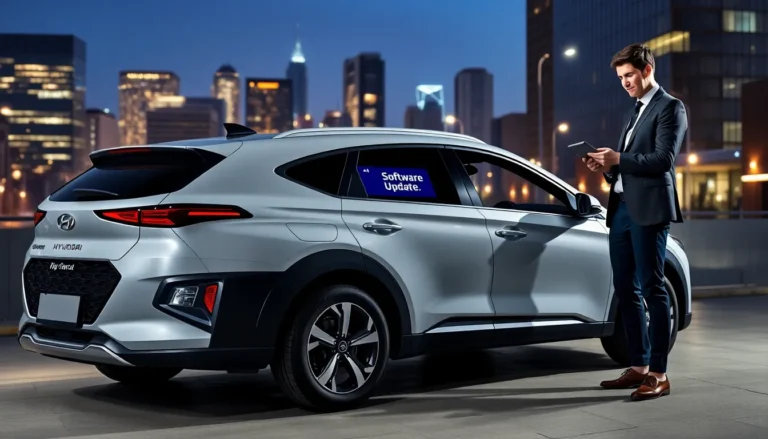Table of Contents
ToggleGen Z is shaking up the film industry like a double shot of espresso on a Monday morning. With their unique perspectives and unfiltered creativity, this generation isn’t just watching movies—they’re redefining what it means to be a filmmaker. From TikTok-inspired shorts to socially conscious narratives, Gen Z is turning traditional storytelling on its head and leaving audiences both entertained and enlightened.
Gone are the days of cookie-cutter plots and predictable endings. Instead, they crave authenticity, representation, and a sprinkle of humor that makes even the most serious topics feel relatable. As streaming platforms scramble to keep up, it’s clear that the future of cinema is in the hands of these digital natives. Buckle up as we dive into the wild world of Gen Z film trends that are not just capturing attention but also changing the game for good.
Overview of Gen Z Film Trends
Generation Z influences film trends significantly through unique storytelling techniques and innovative content. Authenticity resonates deeply with this audience, driving filmmakers to explore genuine experiences. Films reflecting diverse backgrounds and cultures gain traction, ensuring representation on screen. Humor often blends with serious themes, creating a relatable viewing experience.
Streaming platforms prioritize content that appeals to Gen Z preferences. As a result, platforms invest in short-form content and creator-led projects. Bite-sized films and series allow for quick consumption, aligning with the fast-paced nature of this demographic. Collaboration with influencers further connects films with Gen Z, enhancing visibility and engagement.
Inclusivity serves as another hallmark of Gen Z cinema. LGBTQ+ stories, mental health discussions, and racial diversity represent core interests. Such themes encourage open dialogue and foster a sense of community within the audience. Filmmakers increasingly incorporate these elements into their narratives to resonate with viewers.
Technology also shapes Gen Z’s film experience. Interactive storytelling, virtual reality, and augmented reality engage audiences in immersive ways. These advancements invite viewers to participate actively instead of passively watching. Moreover, social media fuels promotional strategies, allowing films to reach their target audience rapidly.
Research indicates that these trends will continue to evolve as Gen Z’s preferences shift. The film industry must adapt to remain relevant, as this generation fuels demand for innovative content that reflects their values and experiences. As traditional narratives fade, more creative and unconventional approaches emerge, paving the way for future filmmakers to explore new horizons.
Characteristics of Gen Z Films

Gen Z films exhibit distinct characteristics that reflect the values and preferences of this generation. Filmmakers prioritize inclusivity and authenticity, creating a unique cinematic experience.
Diverse Representation
Diverse representation stands out as a key feature in Gen Z films. Films prominently feature LGBTQ+ narratives, showcasing authentic characters and stories that resonate with younger audiences. Multicultural casts reflect today’s society, bridging gaps between different demographics. Intersectionality also plays a crucial role, highlighting the complexities of identity beyond basic categories. Viewers appreciate seeing themselves represented on screen, fostering a sense of belonging and community. Filmmakers often collaborate with diverse voices, enhancing the authenticity of their stories. As a result, cultural and social discussions emerge, encouraging dialogue and understanding among audiences.
Authentic Storytelling
Authentic storytelling drives Gen Z films. Characters are not mere tropes; they possess depth and complexity, mirroring real-life experiences. Navigating challenging subjects, films tackle issues like mental health and social justice, presenting them in relatable contexts. Viewers connect with stories that reflect their challenges and triumphs. Humor combines with serious themes, making the content engaging while providing valuable insights. Innovations in storytelling techniques, such as nonlinear narratives, keep audiences invested. Filmmakers also leverage social media platforms for grassroots storytelling, allowing authentic engagement with viewers. Overall, this generation pushes for narratives that prioritize genuine emotional connections and resonant experiences.
Popular Genres Among Gen Z
Gen Z favors genres that emphasize emotional engagement and cultural relevance. Their preferences lean toward horror and coming-of-age narratives that reflect their unique perspectives.
Horror and Thriller
Horror films resonate strongly with Gen Z audiences. This generation appreciates the psychological depth and social commentary often embedded in modern horror narratives. They gravitate toward films that challenge societal norms and explore issues like mental health and identity, making the genre both entertaining and thought-provoking. Many successful titles incorporate humor alongside fear, appealing to Gen Z’s preference for balance. Streaming platforms frequently showcase indie horror projects, catering to young viewers seeking innovative storytelling. Notable examples include A Quiet Place and Get Out, which highlight the genre’s ability to merge scares with relevant conversation.
Coming-of-Age Stories
Coming-of-age stories hold significant appeal for Gen Z. Many viewers find these narratives relatable, as they navigate their own transitions into adulthood. The focus on self-discovery, identity, and personal struggles resonates deeply. Films in this genre often tackle themes like anxiety, sexuality, and diversity, reflecting Gen Z’s values. Titles like Eighth Grade and Booksmart exemplify this trend, presenting genuine representations of youth experiences. Authentic portrayals and relatable characters drive engagement, illustrating how Gen Z leaders in film prefer content that reflects their realities. Streaming services invest heavily in these narratives, recognizing the demand for compelling, relatable storytelling.
Impact of Social Media on Film Consumption
Social media significantly shapes how Gen Z engages with films. Platforms like TikTok, Instagram, and Twitter amplify film discovery and conversation.
Viral Marketing Strategies
Innovative marketing campaigns capture Gen Z’s attention quickly. Short, shareable video clips highlight key movie moments, creating buzz across platforms. Memes and challenges often accompany these clips, encouraging user interaction and participation. Hashtags trend alongside releases, driving organic engagement. Upcoming films often leverage user-generated content to foster community involvement. Strategic partnerships with social media platforms ensure targeted advertisements reach younger audiences effectively. By relying on viral strategies, studios maximize exposure while catering to Gen Z’s preferences for authentic and relatable messaging.
Influencer Collaborations
Influencer collaborations significantly enhance film visibility among Gen Z audiences. Influencers often share personal reflections or reactions to films, making recommendations relatable and authentic. Many film releases partner with relevant influencers to create tailored content that resonates with their followers. The influence of these creators often leads to increased ticket sales and streaming views. Live Q&A sessions with cast members or filmmakers create a direct connection that amplifies interest. Collaborating with influencers aligns films with cultural moments and current trends, helping studios remain relevant in a fast-paced digital landscape.
Notable Gen Z Filmmakers and Films
Generation Z filmmakers are reshaping the cinematic landscape, bringing fresh voices and unique perspectives to the forefront. Their innovative storytelling approaches capture the essence of their experiences.
Emerging Talents
Emerging talents like Olivia Rodrigo and Bo Burnham have quickly made their mark on the industry. Rodrigo’s “Driving Home 2 U” blends documentary and performance, showcasing her personal journey through music. Similarly, Burnham’s “Inside” reflects the struggles of lockdown life with humor and introspection. In addition, filmmakers like Emma Sadler and Adamma Ebo are gaining recognition for their engaging narratives. Sadler’s films often highlight mental health, while Ebo’s work focuses on cultural representation.
Breakout Hits
Breakout hits include titles like “Everything Everywhere All at Once” and “The Fallout.” “Everything Everywhere All at Once” blends sci-fi with personal discovery, resonating with Gen Z’s desire for authenticity. On the other hand, “The Fallout” addresses the complexities of grief and friendship, reflecting the emotional depth of young adulthood. Each film tackles relatable themes, making them popular choices among Gen Z audiences. These works exemplify how up-and-coming filmmakers are redefining societal norms and standards in filmmaking.
Generation Z is undeniably reshaping the film industry with their distinct preferences and innovative storytelling. Their demand for authenticity and representation is leading to a more inclusive cinematic landscape that resonates deeply with diverse audiences. As filmmakers embrace these trends they’re not just creating films but also fostering meaningful conversations around mental health and social justice.
Streaming platforms are evolving to meet Gen Z’s expectations by prioritizing content that aligns with their fast-paced lifestyles. This shift toward short-form and creator-led projects reflects a broader understanding of how this generation engages with media. As Gen Z continues to influence the industry the future of film promises to be more dynamic and representative than ever before.




